
Three semi-stationary speed measurement systems have been deployed to increase traffic safety in Germany's Aachen city region in a contract worth in the "high six-digit euro range".
The Jenoptik trailers - nicknamed Nils, Thomas, and Willi - are used to measure vehicle speeds in both directions "at different high-risk locations", the firm says.
The systems have enough charge for about a week of operations before their batteries are recharged and they are relocated. Aachen already has stationary speed management systems.
Gerrit Palm, vice president sales region EMEA of Jenoptik’s Smart Mobility Solutions business, says the deployment is "an important contribution to the Vision Zero initiative".
"Unfortunately, severe accidents with traffic fatalities remain a daily occurrence on German roads, and one of the main causes is excessive speed.”









